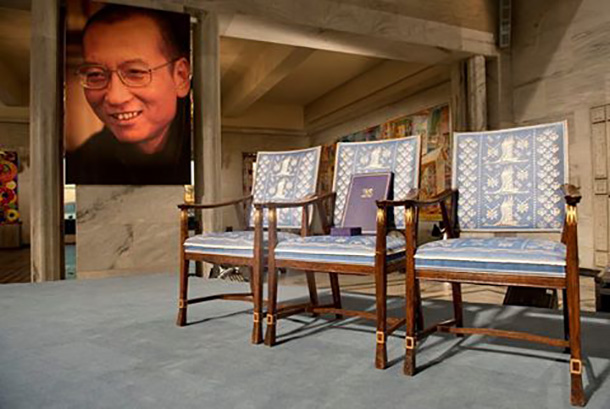 Dharamshala — Authorities of the Chinese communist regime have refused Nobel Peace laureate Liu Xiaobo permission to move home to Beijing or seek medical treatment outside China as fears mount he is close to death after being diagnosed with late-stage liver cancer.
Dharamshala — Authorities of the Chinese communist regime have refused Nobel Peace laureate Liu Xiaobo permission to move home to Beijing or seek medical treatment outside China as fears mount he is close to death after being diagnosed with late-stage liver cancer.
The international community, governments and Rights groups call for Liu's unconditional release and treatment overseas after terminal liver cancer diagnosis. Tens of thousands of supporters voiced concerns about his health and strongly criticised the way he was treated by Chinese communist authorities.
In a video posted by a friend, Liu's wife Liu Xia said the cancer cannot be treated with chemotherapy or operations at this stage. Liu, was released on medical parole on Monday, June 26, 2017 after serving seven years of an 11-year sentence for inciting subversion of state power. According to friends, the medical team treating him said they would attempt a form of targeted therapy, using drugs to stop the growth and spread of the cancer.
The Norwegian Nobel Committee says it "has received the news about the release of Nobel Peace Prize Laureate Liu Xiaobo with a mixture of relief and deep worry. The Committee is delighted to learn that Liu Xiaobo is out of prison at long last. At the same time the Committee strongly regrets that it took serious illness before Chinese authorities were willing to release him from jail. Liu Xiaobo has fought a relentless struggle in favour of democracy and human rights in China and has already paid a heavy price for his involvement."
"He was, essentially, convicted for exercising his freedom of speech and should never have been sentenced to jail in the first place. Chinese authorities carry a heavy responsibility if Liu Xiaobo, because of his imprisonment, has been denied necessary medical treatment. The Committee hopes that he will now be released without conditions and offered the best possible treatment for his illness, whether it be in China or abroad," it added.
Security is extremely tight at the hospital where Liu is staying in north-east China. Agents have been posted outside the inpatient department, according to journalists who tried to visit him from Hong Kong's HK01 newspaper. Uniformed guards were inspecting visitors and searching any bags, the paper said.
Liu and his wife want to be allowed to travel outside China to seek medical treatment, but authorities have rebuffed their request. Appeals to be moved to his home of Beijing have also been rejected. "It adds injury to insult that Liu Xiaobo, who should never have been put in prison in the first place, has been diagnosed with a grave illness," said , Amnesty International's China Researcher Patrick Poon.
"The Chinese authorities should immediately ensure that Liu Xiaobo receives adequate medical care, effective access to his family and that he and all others imprisoned solely for exercising their human rights are immediately and unconditionally released," he said.
"The authorities must also stop their shameful and illegal house arrest of Liu Xiaobo's wife, Liu Xia, and ensure that she is able to receive visitors, travel freely and reunite with Liu Xiaobo," Patrick Poon added.
Liu is one of only three people to have won the Nobel award while jailed by their own government. Since coming to power in 2012, the Chinese president, Xi Jinping, has launched a series of crackdowns on civil society in an attempt to silence feminist activists, human rights lawyers, journalists and book publishers.
Chinese prisons are notorious for their poor health care, lack of nutritious food and abusive conditions, and it's highly common for prisoners to re-emerge in a deeply weakened state. That may be especially true for the prison in a small northeastern city where Liu has been serving an 11-year sentence for inciting subversion of state power.
Liu won the Nobel peace prize in 2010, less than a year after he was jailed. A literary critic and scholar, Liu was previously jailed for two years following the 1989 Tiananmen Square democracy protests and subsequent massacre.
Liu, 61, was arrested in 2008 after writing a pro-democracy manifesto called Charter 08, in which he called for an end to one-party rule and improvements in human rights. Following a year in detention and a two-hour trial, he was sentenced to 11 years in December 2009 for inciting subversion of state power.
"Awarding the Peace Prize to him is the international community's recognition of the increasing voices among the Chinese people in pushing China towards political, legal and constitutional reforms," His Holiness the Dalai Lama of Tibet said on Liu Xiaobo being awarded the 2010 Nobel Peace Prize.
"I have been personally moved as well as encouraged by the efforts of hundreds of Chinese intellectuals and concerned citizens, including Mr Liu Xiaobo in signing the Charter 08, which calls for democracy and freedom in China," he said.
"I expressed my admiration in a public statement on 12 December 2008, two days after it was released and while I was on a visit to Poland. I believe in the years ahead, future generations of Chinese will be able to enjoy the fruits of the efforts that the current Chinese citizens are making towards responsible governance," the Tibetan leader added.
In 2013, more than 450,000 people from 130 countries signed a petition created by Archbishop Desmond Tutu to demand the couple's immediate release. The petition was launched in solidarity with a letter signed by 134 Nobel laureates demanding Liu's freedom.


![Tibet has a rich history as a sovereign nation until the 1950s when it was invaded by China. [Photo: File]](/images/stories/Pics-2024/March/Tibet-Nation-1940s.jpg#joomlaImage://local-images/stories/Pics-2024/March/Tibet-Nation-1940s.jpg?width=1489&height=878)















